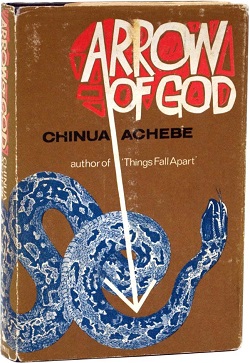Arrow of God

First edition
|
|
| Author | Chinua Achebe |
|---|---|
| Country | United States |
| Language | English |
| Publisher |
Heinemann London |
|
Publication date
|
1964 |
| Media type | Print (Hardback) |
| Pages | 287 pp |
| Preceded by | No Longer at Ease |
| Followed by | A Man of the People |
Arrow of God is a 1964 novel by Chinua Achebe, his third novel after No Longer At Ease. These two books, along with the first book, Things Fall Apart, are sometimes called The African Trilogy, as they share similar settings and themes. The novel centers on Ezeulu, the chief priest of several Igbo villages in Colonial Nigeria, who confronts colonial powers and Christian missionaries in the 1920s. The novel was published as part of the influential Heinemann African Writers Series.
The phrase "Arrow of God" is drawn from an Igbo proverb in which a person, or sometimes an event, is said to represent the will of God.Arrow of God won the first ever Jock Campbell/New Statesman Prize for African writing.
The novel is set amongst the villages of the Igbo people in British Nigeria during the 1920s. Ezeulu is the chief priest of the god Ulu, worshipped by the six villages of Umuaro. The book begins with Ezeulu and Umuaro fighting against a nearby village, Okperi. The conflict is abruptly resolved when T.K. Winterbottom, the British colonial overseer, intervenes.
After the conflict, a Christian missionary, John Goodcountry, arrives in Umuaro. Goodcountry begins to tell the villages tales of Nigerians in the Niger Delta who abandoned (and battled) their traditional "bad customs" in favor of Christianity.
Ezeulu is called away from his village by Winterbottom and is invited to become a part of the colonial administration, a policy known as indirect rule. Ezeulu refuses to be a "white man's chief" and is thrown in prison. In Umuaro, the people cannot harvest the yams until Ezeulu has called the New Yam Feast to give thanks to Ulu. When Ezeulu returns from prison, he refuses to call the feast despite being implored by other important men in the village to compromise. Ezeulu reasons to the people and to himself that it is not his will but Ulu's; Ezeulu believes himself to be half spirit and half man. The yams begin to rot in the field, and a famine ensues for which the village blames Ezeulu. Seeing this as an opportunity, John Goodcountry proposes that the village offer thanks to the Christian God instead so that they may harvest what remains of their crops with "immunity".
...
Wikipedia
